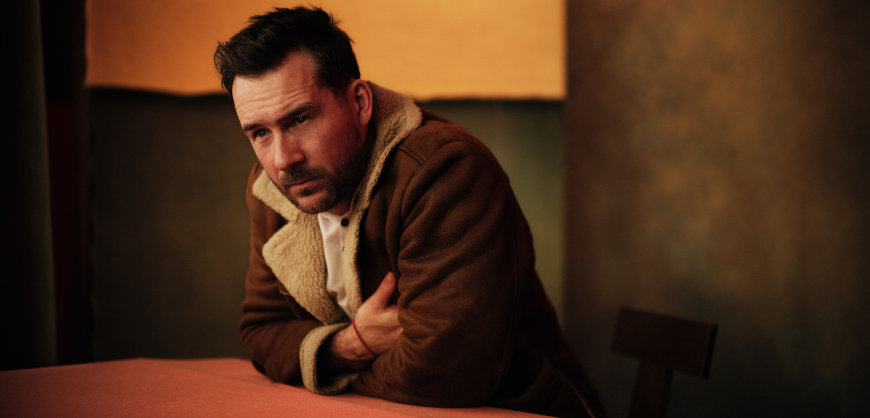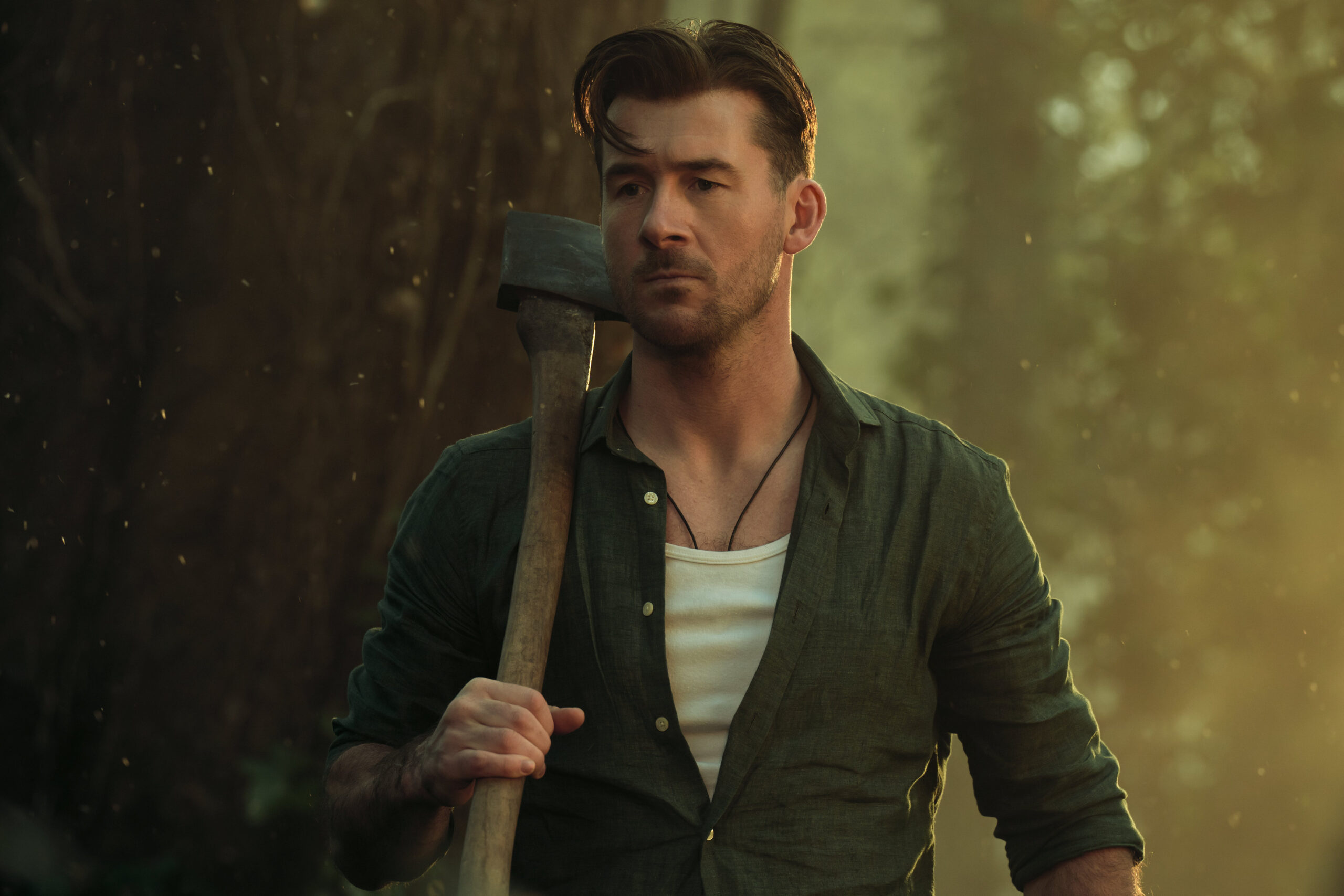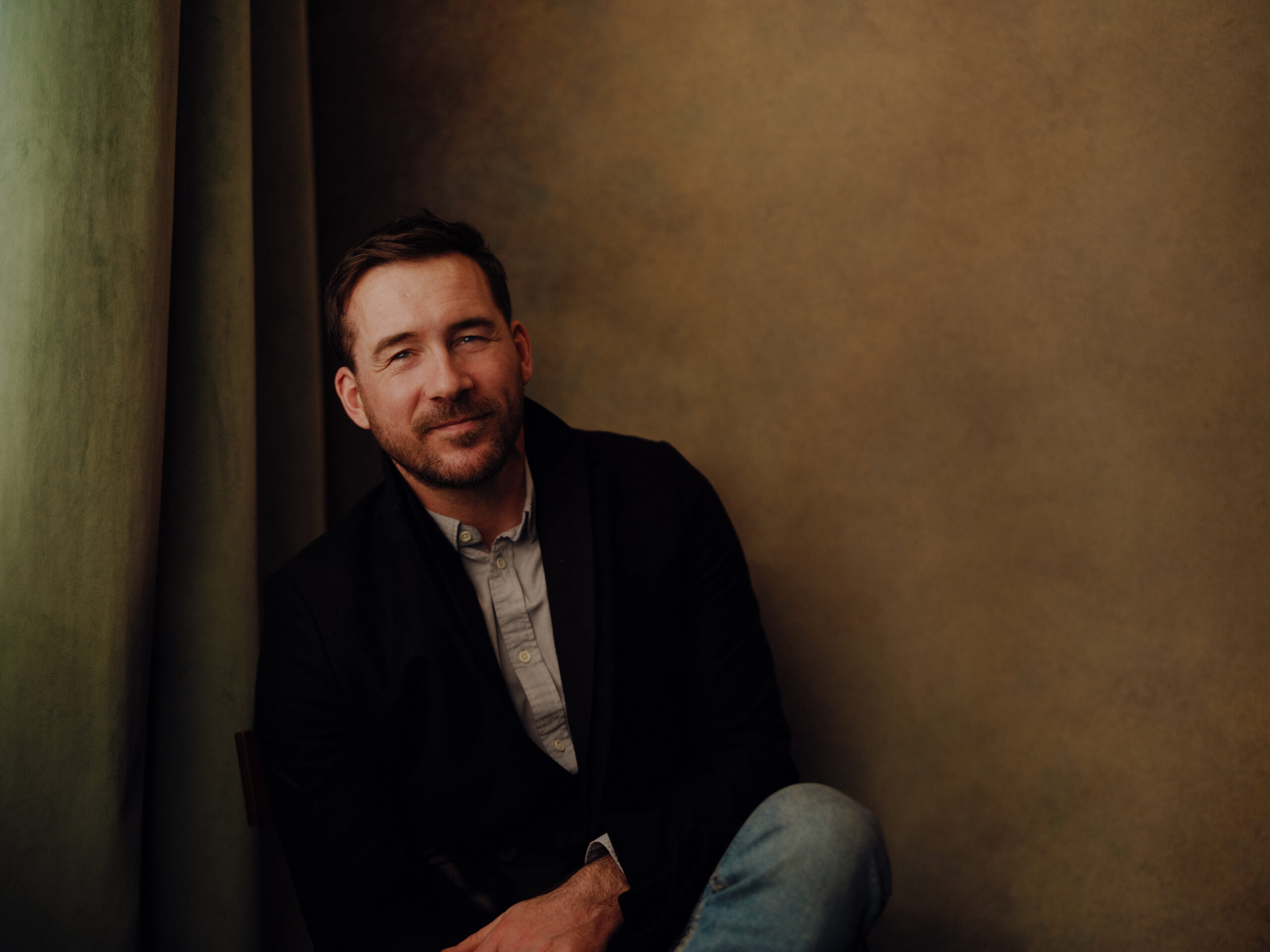Garston-born, LA-based actor Barry Sloane is known for bringing raw, emotionally charged characters to life across stage, screen and video games.
Here, he reflects on the choices that have shaped a career which includes voicing Captain Price in the blockbuster Call of Duty franchise, a blistering turn as Yosser in Boys from the Blackstuff, and a role in Tony Schumacher’s new Liverpool-set BBC drama The Cage
Words | Lawrence Saunders
From a young age you were involved in music and drama, and you’ve spoken before about having a ‘drive to create and perform’. Where do you think that comes from?
There was never anyone else in our family who acted. I was the first one to do it, which actually alleviated a lot of the pressure. There was no kind of benchmark for anything. There were highly creative people in my family but no one had used that to earn a living. I realise now that it was a positive manifestation – I was creating a reality for myself through thought. I didn’t know how exactly it was going to happen, but I knew I was going to succeed in some way.
I was fortunate that one of my mates wanted to start a band, and I say this to my 15-year-old daughter now: ‘You make decisions at points in your life and you don’t realise how pivotal they are going to be’. It’s just a small thing – which mates you pick, and them saying ‘Do you wanna form a band’ – and you’ve no idea what to do, but you think: ‘I’ll just pick up that guitar and hit the strings like Bez from the Happy Mondays or something’.
And so I was off and running. I was creating something; I was creating art – it was everything. It was the early to mid ’90s, which was such a great time to be in bands. Not only were The Beatles pivotal in showing me it was possible to be from this city and be anything [I wanted to be], but Oasis, for a working-class lad, were just as important. They just did, they stood there with a snarl and an arrogance and said: ‘We’re gonna f *****g do this’. And it really gave me an extra kick, it was like: ‘Come on, let’s have it!’.
How did you make the leap from playing in bands to landing your first acting roles?
The guy managing our band, Smiling Jackals, also ran an extras agency. He’d put us up for certain things and say: ‘This will pay for your rehearsal’. In 1999, an American production company was casting a Beatles movie in Liverpool, and they were looking for real musicians. I went down to the open audition with the guitar my mum and dad had bought me. I tried out for the role of John Lennon but didn’t get it. I did, however, land a part in the film – I played Ivan Vaughan, the man who introduced John to Paul McCartney. Getting that role was brilliant because it brought music and acting together. It all aligned perfectly for me.
Around 2001/2002, Smiling Jackals were doing really well and we’d had a few showcases with various record companies. At the same time, I was auditioning for Brookside, which I’d tried out for a couple of times before. A couple of years earlier, the band had been nominated for ‘Best Liverpool Band’ at the Echo Arts Awards. We were all drunk, jumping around and making fools of ourselves – as young lads do. Phil Redmond had spotted me at some point during the night, so when I later went to a meeting about being part of a new family in Brookside, he said: ‘Were you the one jumping around the table and knocking things over like Liam Gallagher?’ And I was like: ‘Yeah, that was me!’
Fortunately, the meeting went well from there and I got offered a role. I had to make a choice then – I couldn’t do Brookside and the band. I chose Brookside, and that became my YTS, my college, my university. One of the best things about that show was how it gave young Liverpool talent a platform to succeed. Those opportunities haven’t really been there since, but they are coming back now, thank God, with things like The Responder, This City Is Ours, and the new one I’ve just finished, The Cage.
It was interesting starting out, because after the success of Brookside and other Liverpool shows, casting breakdowns often said: ‘No scouse accents’. Which was crazy. So I realised quite early on that I had to learn other accents, and I’ve spent much of my career not actually playing scousers.
One of the few scouse characters you have played is arguably the most famous Liverpudlian in TV history. What was it like stepping into the role of Yosser Hughes for the stage adaptation of Boys from the Blackstuff?
I’ve always loved Boys from the Blackstuff. Years ago, when I was doing Blood Brothers, I’d make any new non-scouse cast member sit and watch it. I’d say: ‘I know Blood Brothers is a bit light, but this is the city we’re talking about. I want you to understand the time period and the stakes’. I was kind of obsessed with it – definitely obsessed with Bernard Hill’s performance as Yosser. It was my dad’s favourite character of all time as well. When the opportunity came up to play him, I was doing a revival of Jerusalem in the West End, the play that in 2009 changed my career and mine and my family’s life forever. I told my agent I had to be seen for Yosser.
I got a meeting and I was ready – grew the muzzy, put some black make-up under my eyes so I looked like s**t. And I just smashed it. After I finished, Alan Bleasdale said: ‘That was absolutely terrifying’. And I replied: ‘I hope that’s what you’re looking for’ [laughs]. Honestly, I would have been happy just playing Yosser in that audition for 35 minutes – I love the character that much. But fortunately, I got the part, and it’s truly one of the great honours of my career.
Performing at the Royal Court was incredibly special. We had grown men, who maybe aren’t used to feeling stuff, shouting out: ‘Don’t you break, Yosser! Don’t you f *****g break!’ It was heartbreaking, because there’s a massive part of the character that the audience identifies with. Taking the show down to London as well, playing it at the National Theatre, showing the fight we scousers have – that was unbelievable. I loved it.
The Sandman. Barry Sloane as Destruction in episode 206 of The Sandman. Cr. Ed Miller/Netflix © 2025
Yosser is such an intense and complex character – was it difficult to switch off after the job ended?
Yes, I was ready for the break, to be honest. I’d already told them I wouldn’t be doing the tour. I really had exhausted myself. I’d read interviews with Bernard before, where he spoke about how he lost himself a little bit playing the role and how it really affected him.
Yosser’s energy is very tough to hold, night after night, for a long time. My body broke after I’d finished – I was in agony because of the tension I’d been holding, and I actually lost some hearing. It’s quite profound what can happen with that kind of energy, because you’re calling on it every night and your body doesn’t always understand that it isn’t real. The brain can know it’s not real, but if you keep putting in trauma, the body releases the same chemicals into your system as it would if these things were really happening. So, night after night you’re getting this rush of toxins, and if you don’t clear them properly, it hits you. It was a tough role, but I wouldn’t change a thing. A true highlight of my career.
Apologies if you’ve been asked this a million times before, but how did you come to voice the central figure in Call of Duty, one of the biggest video game franchises in history?
I did a show in the States called Six, which was about US Navy SEALs. We trained extensively with a group of SEALs over a number of years. That included a full-on SEAL ‘Hell Week’, house clearances, camping, hiking, swimming, parachuting – the whole shebang! I became quite good friends with the lads because we spent so much time together.
When Call of Duty: Modern Warfare came around, one of the SEALs was working as a technical advisor on the game for the developer Infinity Ward. A meeting came about, and they knew I was trained enough not to come in and play some hardman soldier – I could just relax and be the character. A lot of the work in the cut scenes isn’t about running around with a gun, it’s about how you hold it, how comfortable you are in that environment.
I went in for the audition and did really well – obviously, because I got the job [laughs]. I didn’t know at the time that it was Captain Price I was auditioning for, because they keep these things so hush-hush. But midway through, the narrative director, Taylor Kurosaki, wrote on a piece of paper: It’s Captain Price, because they wanted me to nail it. I’d played the previous games, so I knew straight away it was a major role. I had to say, ‘Under my command, Captain John Price’, and I made him scouse – because I wanted him to be scouse [laughs]. I really pushed for it, but there was a bit of pushback from the Americans who struggled to understand the accent [laughs]. So, I’ve been doing Captain Price since 2018, and it’s been amazing.
What can you tell us about the new BBC drama set in Liverpool called The Cage, and your character, Gary?
It’s the new show from Tony Schumacher, who of course created The Responder. It’s set in a Liverpool city centre casino and stars Sheridan Smith and Michael Socha. Their characters, Leanne and Matty, both work in the casino and are secretly stealing money from the cage – that’s the area where all the financial transactions happen. They are doing it separately until they realise what the other one is up to, and they are kind of caught.
My character, Gary, and his mother, Nancy – played by Geraldine James – own the casino. I’m not exactly legal [laughs]. I’m basically the threat Leanne and Matty don’t want in their lives. It’s such an amazing show, and Gary is one of the best characters I’ve ever played. I honestly can’t wait for people to see it. Doing my own accent was a massive thing too – it gave me so much freedom to improvise and I just instinctively knew how to play this lad.
This City Is Ours has gone down really well, so I know people are enjoying that type of character. I actually waited until after filming to watch it, because I didn’t want to be influenced by what James [Nelson-Joyce] had done. I’m glad I did, because we’ve both done very different things with our characters [laughs].
You’ve also joined House of the Dragon (the Game of Thrones spin-off) for the third series. What’s it been like stepping into such a massive and popular show?
It’s been brilliant. The Sandman, which is out now on Netflix, was similar in terms of scale. I’ve been doing American TV for over a decade, so I’m used to that side of things. But I’m a fan of Game of Thrones, so being part of that world was great – especially putting all the gear on. I spent a lot of time walking around the castle, which was amazing because the sets are incredible. The costume’s a bit uncomfortable, but it looks f*****g cool, so I’m happy to wear it [laughs]. I’m just excited to be part of it – and for everything else that’s coming up. It’s epic.
If that wasn’t enough, you’ve also got your band back together. How did that come about, and why did you decide now was the right time to reform Smiling Jackals?
It’s been a long time. Me, Nick (Kilroe) and Rob (Nico) have kept in touch regularly over the years since we split. Nick played with a Liverpool band called The Black Velvets, did really well, then went on to be Echo & the Bunnymen’s drummer for nearly 10 years, and also played a bit with the Icicle Works.
We actually talked about reforming back in 2015, but I was working a lot in the States then, so getting together in the same place was nearly impossible. The reason it’s worked out now is because of my filming schedule. I’ve been in England for a good chunk of time, so we’ve finally been able to get into the studio and actually record.
So that passion for music and that want to make music has never left you over the years?
It’s just a piece of art. The big difference between doing it now and the first time around is that there’s no pressure. We’re not trying to get to number one – we’re in our 40s, it’s a different vibe. Now it’s just fun: making art with your mates. And, fortunately, because of the reach we’ve got, these new songs have already had hundreds of thousands of listens.
If you’d told the 19-year-old me that would happen, he’d have been over the moon – he’d probably have retired! Mind you, back in ’99 we’d have been selling CDs, so I might have made a nice little killing there. Streaming’s different though [laughs]. But we’re not in it for the money. We’ve already put out two releases – ‘Health Junkie’ and ‘Monster’ – and there’s another single coming in October.
Barry stars in season two of The Sandman, now streaming on Netflix. The Cage will be available to watch on BBC One and iPlayer in late 2025 or early 2026


